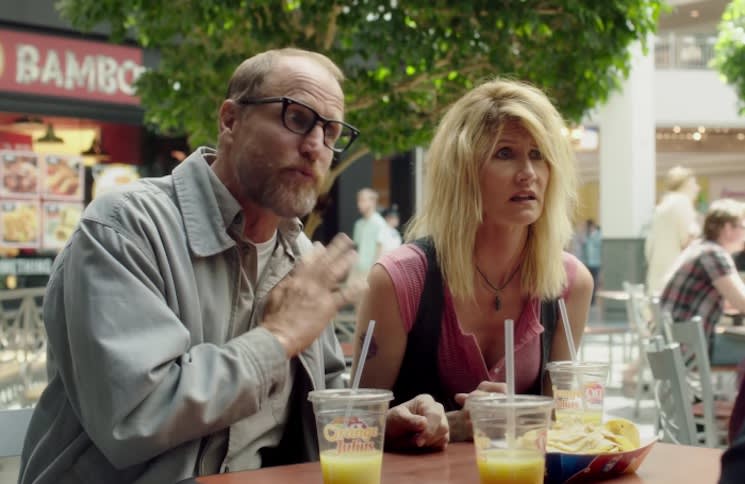You can't blame anyone for dipping into cartoonist Daniel Clowes' archives for the next sardonic cult classic — the 2001 adaptation of Ghost World remains a fan favourite, while Art School Confidential, though less adored, has its champions. But despite its Clowes-written screenplay and star-studded cast, Wilson — based on Clowes' comic of the same name — is a far cry from its source material.
The comics turn Wilson's (Woody Harrelson) attempts to reconnect with his ex-wife Pippi (Laura Dern) and the teenage daughter he never knew he had into an engaging narrative about the weight of human loneliness, using the almost absurdist turn of events to cut sharply to a relatable truth, as is Clowes' strength. However, where the comics used Wilson's fragile duality as a vehicle to get to the relatable heart of the matter — the human need for emotional intimacy, no matter how destructive — the film relies too much on Wilson's spontaneous outbursts as mere punch lines, trying to squeeze too much mileage out of random swearing. That over-reliance on shock value, instead of the comics' subtle musings wrapped in bombastic provocations, greatly dumbs down the story and its subsequent impact.
Wilson is a fascinating character, an unrelenting misanthrope with a magnetic desire for human connection. Despite his dour outlook, he can't seem to stop himself from steering headfirst into interactions with anyone around him, no matter how uncomfortable. But the scenarios veer into cringe-worthy territory fairly quickly, so although Harrelson imbues Wilson with plenty of charm, the film's excruciatingly cyclical plodding means that the shuddering never stops. Situations that are hilarious on paper are just painful to watch, especially when there's no underlying moral to provide much-needed payoff.
Though some of the one-off gags in the comics — Wilson's fascination with an icicle hanging off a basketball hoop, a tattoo he finds on Pippi's lower back — serve as insular little character moments, these throwaway gags come off as superfluous on the big screen. The film makes some concessions to the comics' larger narrative to better fit the medium, but in refusing to treat the little details, it fails to smooth out the content. This disjointed style worked in the comic book, which was structured as a series of strips, each with their own drawing style and punch line, but there's no such visual conceit here — it just comes off as uneven and repetitive.
Instead of going for poignant commentary on the ugliness — and, if you squint hard enough, beauty — of human nature, Wilson seems too content to simply revel in everyone's shit. And isn't there enough of that in this world already?
(Searchlight Pictures)The comics turn Wilson's (Woody Harrelson) attempts to reconnect with his ex-wife Pippi (Laura Dern) and the teenage daughter he never knew he had into an engaging narrative about the weight of human loneliness, using the almost absurdist turn of events to cut sharply to a relatable truth, as is Clowes' strength. However, where the comics used Wilson's fragile duality as a vehicle to get to the relatable heart of the matter — the human need for emotional intimacy, no matter how destructive — the film relies too much on Wilson's spontaneous outbursts as mere punch lines, trying to squeeze too much mileage out of random swearing. That over-reliance on shock value, instead of the comics' subtle musings wrapped in bombastic provocations, greatly dumbs down the story and its subsequent impact.
Wilson is a fascinating character, an unrelenting misanthrope with a magnetic desire for human connection. Despite his dour outlook, he can't seem to stop himself from steering headfirst into interactions with anyone around him, no matter how uncomfortable. But the scenarios veer into cringe-worthy territory fairly quickly, so although Harrelson imbues Wilson with plenty of charm, the film's excruciatingly cyclical plodding means that the shuddering never stops. Situations that are hilarious on paper are just painful to watch, especially when there's no underlying moral to provide much-needed payoff.
Though some of the one-off gags in the comics — Wilson's fascination with an icicle hanging off a basketball hoop, a tattoo he finds on Pippi's lower back — serve as insular little character moments, these throwaway gags come off as superfluous on the big screen. The film makes some concessions to the comics' larger narrative to better fit the medium, but in refusing to treat the little details, it fails to smooth out the content. This disjointed style worked in the comic book, which was structured as a series of strips, each with their own drawing style and punch line, but there's no such visual conceit here — it just comes off as uneven and repetitive.
Instead of going for poignant commentary on the ugliness — and, if you squint hard enough, beauty — of human nature, Wilson seems too content to simply revel in everyone's shit. And isn't there enough of that in this world already?




